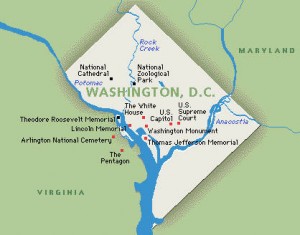 The Constitution provided for a seat of government for the United States, as the new government could not depend upon states for its own security. It did not provide voting rights for those living there.
The Constitution provided for a seat of government for the United States, as the new government could not depend upon states for its own security. It did not provide voting rights for those living there.
The Constitution’s Article I, Section 8, clause 17 empowered Congress to establish a seat of government, and also to exercise exclusive authority over the territory. This authority was established as follows:
“To exercise exclusive legislation in all cases whatsoever, over such District (not exceeding ten miles square) as may, by cession of particular states, and the acceptance of Congress, become the seat of the government of the United States…”
In granting the governing authority to Congress, the Constitution made no provision whatever for residents of a district created pursuant to clause 17 to vote for any official in any election.
The Creation of Washington, DC
With the constitutional authorization, Maryland and Virginia offered land to the federal government for its permanent home. In 1790, Congress delegated to President Washington the authority to choose a site along the Potomac River and he made his choice in January, 1791.
At that time there were fewer than 5,000 residents of the area and it was believed it would be a governmental center without a significant population. As a result, little consideration was given to issues of voting for the residents.
Voting Rights History in DC
Congress has dominated the government of the city of Washington and the District of Columbia since the district was created. In the 1820s Congress allowed citizens of the district to vote for a mayor and city council. A territorial form of government for the district was created in 1871. The president appointed all the district officials. In 1874 Congress reestablished direct control over the city government.
District residents were denied all rights to vote from the 1870’s until 1961. Residents paid federal and local taxes and were drafted into the military, but for nearly ninety years they had no vote on any issue, either locally or nationally.
Twenty-Third Amendment Grants DC Right to Vote in Presidential Elections
By 1960, the population of Washington, DC had grown to 760,000 residents, more than the population of 13 states. While the absence of voting rights for this many people was at odds with the country’s principles, politics stood in the way. It was expected that if the District were to vote it would be reliably Democratic.
On June 16, 1960, Congress finally sent the following proposal to the States:
Section 1. The District constituting the seat of Government of the United States shall appoint in such manner as the Congress may direct: A number of electors of President and Vice President equal to the whole number of Senators and Representatives in Congress to which the District would be entitled if it were a State, but in no event more than the least populous State; they shall be in addition to those appointed by the States, but they shall be considered, for the purposes of the election of President and Vice President, to be electors appointed by a State; and they shall meet in the District and perform such duties as provided by the twelfth article of amendment.
Section 2. The Congress shall have power to enforce this article using appropriate legislation.
On March 29, 1961 with the ratifications of Kansas and Ohio, the Twenty-Third Amendment became part of the Constitution.
Effect of the Twenty-Third Amendment
The Amendment gave the residents of Washington, DC the right to choose three members of the Electoral College. These individuals would have a say in choosing the President. As expected the District has been reliably Democratic, and in every election since 1964, the District’s three electoral have gone to the Democratic presidential candidate.
Voting Rights in DC Expanded Beyond Presidential Elections
In 1971 Congress granted the residents the ability to send a non-voting member to the House of Representatives. This individual participates in House committees, but has no vote on final legislation. In 1975, local self-rule allowed the residents to choose their own mayor and city council.






[…] constitutional amendments.[2] This took place with the 15th Amendment,[3] 19th Amendment,[4] 23rd Amendment[5] and […]